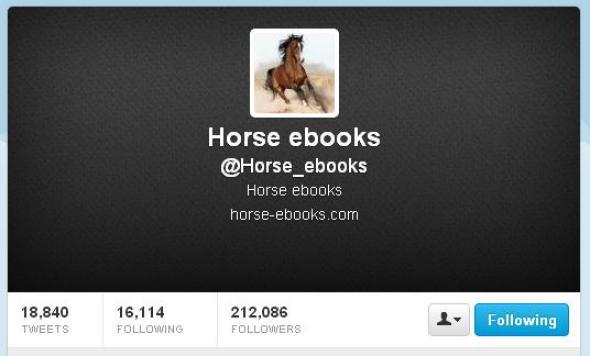Twitter’s most legendary spam bot was no bot at all—at least, not for the past few years. Neither was it the accidentally brilliant work of an elusive Russian Web developer named Alexey Kouznetsov. No, according to The New Yorker’s Susan Orlean, @Horse_ebooks was, at least since September 2011, something less enigmatic: a years-long conceptual art project by Jacob Bakkila and Thomas Bender, one a creative director at Buzzfeed, the other a former vice president of product development at Howcast. Both, according to Orlean, kept their project a secret from their employers until today, when they planned to reveal themselves in a final performance at the Fitzroy Gallery on New York’s Lower East Side and launch “the next installment of the project, a choose-your-own-adventure interactive-video piece called Bear Stearns Bravo.”
That’s well and good, and the Bear Stearns Bravo thingie appears to be here, if you’re still interested. The pair was also behind another, less legendary project called Pronunciation Book. Of course, now that it’s clear to all that the supposed spam bot’s disembodied ramblings were the product of a human mind and not a rogue algorithm, much of the thrill is gone.
The disclosure may come as a surprise to those who thought Gawker’s Adrian Chen had already unmasked Kouznetsov as the human behind the Horse_ebooks handle. Chen himself appeared surprised by the revelation, insisting, “I was not in on this! From what I understand viral marketing people took over @Horse_ebooks in 2011 from Alexey.” A Gawker post today by Max Read supports that theory, noting that Buzzfeed’s Bakkila appeared to have taken over the account from Kuznetsov on Sept. 14, 2011, which is precisely when @Horse_ebooks went from being an amusing yet still relatively obscure spam bot to a Twitter phenomenon, consistently spewing snippets that seemed both plausibly random yet also strangely meaningful.
The news that post-September 2011 @Horse_ebooks was human and not some preternaturally poetic spambot has hit Twitter hard. But in this hour of darkness, the dispirited may console themselves by recalling two salient facts. First, @Horse_ebooks apparently was a spam bot at the beginning, and even then it was pretty great. This feature on the spam bot by Something Awful predates Bakkila and Bender’s purchase of the handle by five months, and is worth revisiting for those interested in what the account looked like before they took it over.
The second thing to keep in mind: As conceptual-viral-marketing-whatevers go, the post-Sept. 14, 2011 @Horse_ebooks was brilliant. Many long suspected that its delightfully truncated tweets could not be entirely random. Yet the account’s creators gleefully toed the line between too-good-to-be-true and just-bad-enough-to-be-true, allowing followers to suspend their disbelief for years on end. On a few occasions its tweets seemed to veer almost toward topicality, yet never so obviously as to shatter the illusion of serendipity. In the end, what people thought was a bot that could pass for a poet turned out to be a poet that could pass for a bot. Either way, lines were successfully blurred.
To be angry at Bakkila and Bender for taking over @Horse_ebooks is to wish that it had remained automated, obscure, and only sporadically delightful—a novelty rather than a phenomenon. Sure, it was sort of amusing in the early days, but its tweets were rarely so perfectly pointed as to inhabit the uncanny valley that its human authors would later plumb. Bakkila and Bender didn’t steal the mystery from @Horse_ebooks. It was their tweets that built the mystery in the first place.
For the uninitiated and the nostalgic, I’ve collected below a few of Horse_ebooks’ greatest hits. The top one is, if I’m not mistaken, the account’s first tweet under human authorship. If so, it’s perfect. And the last one is a piece of sage advice that we would all do well to remember.
This post was updated as more information became available.
Future Tense is a partnership of Arizona State University, the New America Foundation, and Slate.
